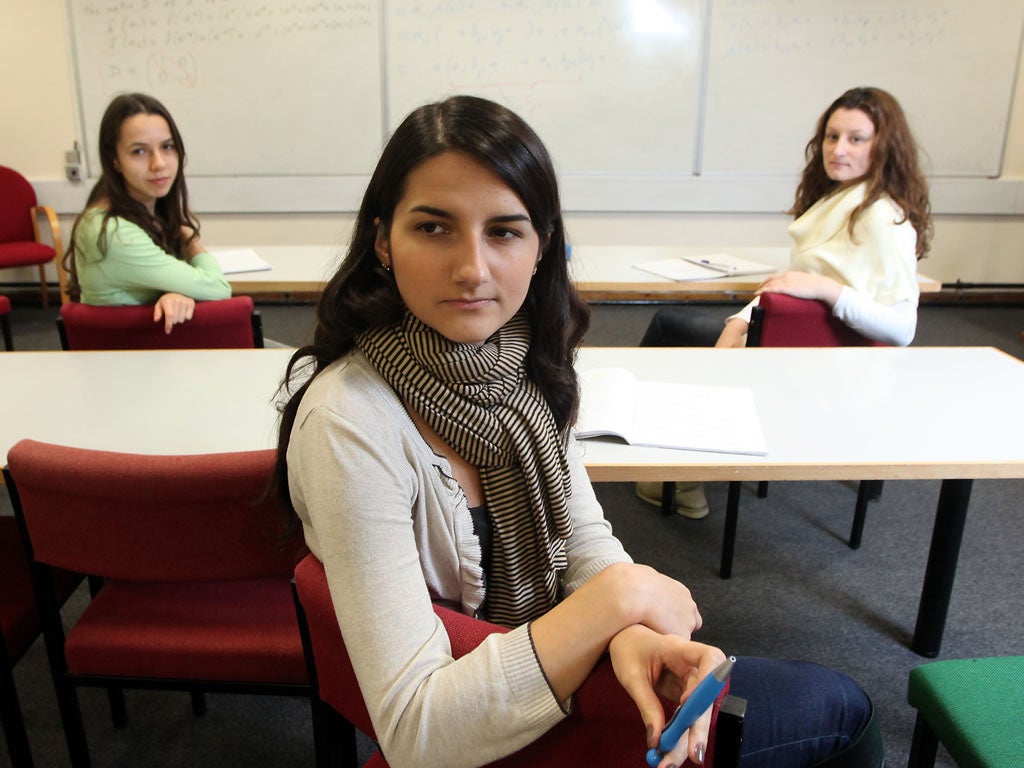Girls 'do better' at university when classes are single sex
New research shows girls achieve higher marks in single-sex lessons at university

Your support helps us to tell the story
From reproductive rights to climate change to Big Tech, The Independent is on the ground when the story is developing. Whether it's investigating the financials of Elon Musk's pro-Trump PAC or producing our latest documentary, 'The A Word', which shines a light on the American women fighting for reproductive rights, we know how important it is to parse out the facts from the messaging.
At such a critical moment in US history, we need reporters on the ground. Your donation allows us to keep sending journalists to speak to both sides of the story.
The Independent is trusted by Americans across the entire political spectrum. And unlike many other quality news outlets, we choose not to lock Americans out of our reporting and analysis with paywalls. We believe quality journalism should be available to everyone, paid for by those who can afford it.
Your support makes all the difference.Girls do better at university if they are taught in single-sex classes, according to new research.
Students at Essex University were randomly split into three groups, male only, female only and mixed.
At the end of the year, the marks of the girls-only class were eight per cent higher than either of the other groups. The split, though, had no effect on the boys' only or mixed classes.
The findings could have policy implications for the way students are taught in future – both at university and in schools, according to academics. It may lead to demands for more single-sex teaching.
Universities, in particular, are striving to become more "consumer-friendly" with the advent of the new fees regime, and may find girls seeking to be taught on their own if they believe it will lead to a higher degree pass.
Patrick Nolen, who conducted the research with Alison Booth – both from the university's economics department, said: "I would like to see policy makers think about this."
The pilot project, involving first-year female economics students, was launched after an experiment with schools in Essex and Suffolk to see if girls taught on their own were more likely to be competitive and take risks than those taught in co-educational classes.
The pupils were randomly split into three groups just like the university students, with the result that those who had been to an all-girls' school showed themselves to be more competitive and prepared to take risks.
In addition, though, the women were also more likely to take high-risk options if they were in the Essex University experiment's all-girls group.
A summary of the project by Drs Nolen and Booth in the New Economic Journal concluded: "This finding is relevant to the policy debate on whether or not single-sex classes within co-ed schools could be a useful way forward."
Students who had taken part in the university experiment were not told details of the research project.
"I think the atmosphere [in the all girls' classes] was more friendly," said Corina Musat, 20. "We bonded because we were all girls." The tutor was male, she added. "We talked about him a lot," she said.
The girls were in the class for only 20 minutes a week but Emilia Matei, also 20, said: "I think it was the best class I had last year. I don't know whether it was because it was a single-sex class or whether it was the teaching."
Diana Burlan, also 20, said: "Boys are more competitive than girls. They like to answer questions. Girls are more shy. Maybe they are afraid of being judged. Maybe that's why we don't answer."
All three are now in their second year and are back in a mixed classroom, and say they are now less likely to be as competitive.
Dr Nolen said that some countries had tried to get around the problem of too few women being on the board of companies by setting a quota system for their leading companies. "We shouldn't be attempting to solve this at that stage," he said. "We should be investigating it and intervening in the environment in which students learn."
Join our commenting forum
Join thought-provoking conversations, follow other Independent readers and see their replies
Comments